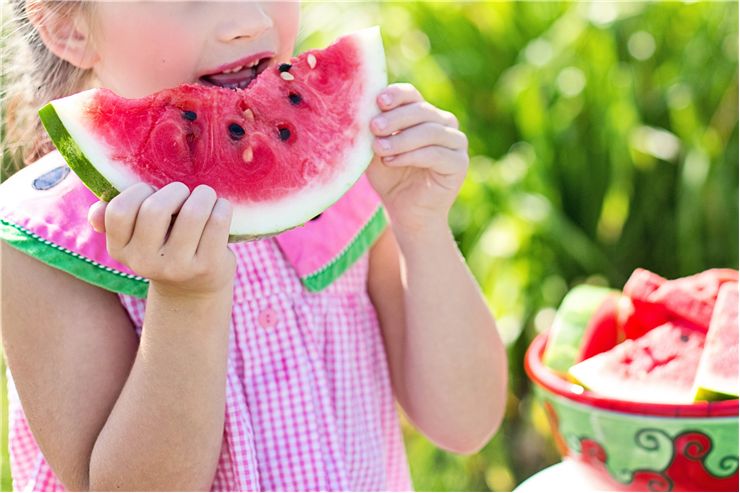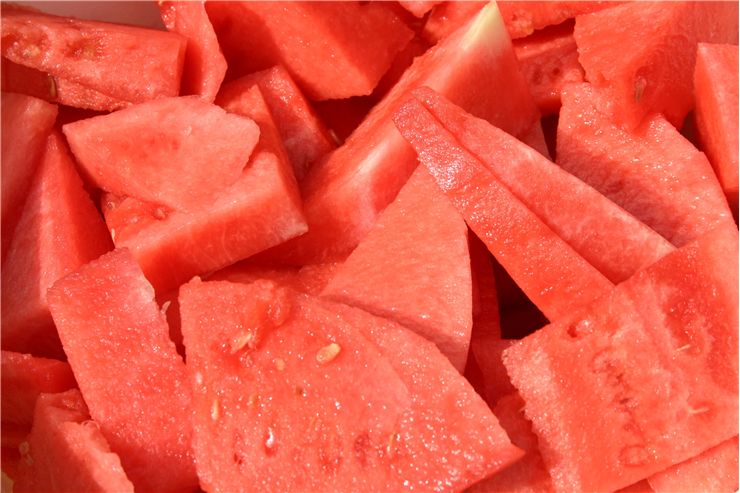Watermelon Facts and Health Benefits of Watermelons
Watermelon is a name for a large annual plant and for its fruit which is a berry (yes, you've read that right). The plant has large hairy leaves and white or yellow flower. The fruit has hard smooth rind that is green that in some types have dark-green stripes or yellow spots. Its interior flesh is soft, juicy and sweet when the fruit is ripe. The color of the interior flesh is often red but it can be orange, yellow, or even white and it holds seeds.
Watermelons are found to grow wild in southern Africa, and opinion is that they originate from there. Their maximum genetic diversity is there, and their wild variants can be sweet, bland and even bitter. But it is later found (by investigating chloroplast DNA) that today's cultivated watermelon and its wild variants, in fact, have common ancestor – Citrullus ecirrhosusa from Namibia (also known as Namib Tsamm). Cultivated watermelon as we know it today appeared in the Ancient Egypt in the second millennium BC. Even the Bible mentioned watermelons as a food of Israelites while they were in Egypt. From there, watermelon started spreading. In 7th century AD it reached India and from there it reached China in the 10th century (today, China is the largest producer of watermelons). Around the same time, Moorish invaders brought a watermelon to south Europe. It needed a few centuries to start appearing in the rest of the Europe but buy the 17th century it was planted as a minor garden crop. From Europe, it crossed into Americas.

- Today there are over 1,200 different types of watermelon grown around the world.
- Every part of the watermelon is edible – even the rind and the seeds. Certain kinds of watermelon don't even have seeds.
- Some watermelons can have over 90kg, but most are around few kilograms.
- Most watermelons are around 6% sugar and 91% water.
- Watermelons are very healthy to eat. A serving cup of watermelon has 46 calories, 0g of fat and cholesterol, 1g of protein, 11g of carbohydrates, 1g of protein, 1g of dietary fiber, 2mg of sodium, 865 International Units of vitamin A, around 1 mg of niacin, pantothenic acid, thiamin, and vitamin B6 each, 12mg of vitamin C, 11mg of calcium, 15mg of magnesium, 170mg of potassium, 250mg of citrulline, and around 8mg of carotenoids (lycopene).
- Vitamin C and beta-carotene are antioxidants which destroy free radicals. This way they prevent heart disease, cancer, and other chronic conditions.
- Lycopene reduces the risk of cancer in prostate, breast, lung and colon.
- Our kidneys convert citrulline from watermelon into arginine which, in higher quantities, can help improve blood flow and cardiovascular health in general. Arginine also removes ammonia from the body, speeds the delivery of white blood cells to the places where the body is injured, and speeds up the growth of new skin tissue. It also relaxes and expands blood vessels, acting similarly to the erectile dysfunction drug Viagra, and may also increase libido.
- Potassium that is found in a watermelon helps muscle and nerve function and is an important component of cell and helps controlling heart rate and blood pressure.
- Because of the high amount of water that it poses, watermelon acts as diuretic.
- Flavonoids, Phenolic antioxidants, lycopene, and vitamin C have the highest concentration near the rind of the watermelon.
- Low fat and cholesterol make watermelon ideal food diet. The high amount of water and electrolytes make watermelon very refreshing food, especially in summer.
- 100 g of fresh watermelon provides 19% of daily required levels of vitamin A which helps vision and immunity, maintains healthy mucous membranes and skin, and protects from lung and oral cavity cancers.

